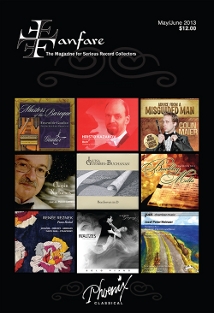Texte paru dans: / Appeared in:

Fanfare Magazine: 36:5 (05-06/2013)
Pour
s'abonner / Subscription information
Les abonnés à Fanfare Magazine ont accès aux archives du
magazine sur internet.
Subscribers to Fanfare Magazine have access to the archives of the magazine
on the net.
Aparté
AP043

3149028024425
Consultez toutes les évaluations recensées pour ce cd
~~~~ Reach all the evaluations located for this CD
Christophe Rousset has drawn from all four books of Duphly’s published harpsichord works (1744, 1748, 1756, and 1768) for this two-disc set. His versions are fleet, coming down unambiguously alongside Mitzi Meyerson (MDG 6005 1068) and Skip Sempé (Paradizo 0007) in the matter of tempos. He shifts tempos less suddenly and self-consciously than Meyerson, however—except in rondeaus and trio sections where dramatic changes are sometimes desirable—and phrases more flexibly than Sempé, whose manneristic performances, with abrupt pauses and impulsive forward jumps, recall stories of 19th-century concert pianists. All three are at their most impressive in the more virtuosic pieces that begin with the Scarlatti-like La Millettina and La Lanza in the first book, published shortly after Boivin had issued a collection of sonatas by the harpsichord teacher to the Spanish Infante. They are least effective in the slower pieces, such as La du Buq and La D’Héricourt, where their rushed tempos and emphasis on linear movement rather than harmony deprive the music of gravitas. La D’Héricourt in particular is marked noblement et vif, but when played on this album sounds more like an aggressive jobber.
An interesting comparison can be made between Rousset’s performances and those of Elisabeth Joyé, whose disc of Duphly (Alpha 150) I praised in Fanfare 33:3. Her approach is more relaxed, her tempos often significantly slower than those of Rousset. In Rousset’s hands, the Rondeau la Pothoüin loses the feeling of regret Joyé achieves through greater weight to the bass line and the powerful harmonies in the sixth and seventh measures. Then there is perhaps the best known piece by Duphly, today, La Forqueray. At 92 bpm, Joyé gives it a proud, brooding weight, with a flexible treatment that allows for emphasis leading into, or on, the cadence. Rousset, at 104 bpm, still makes something arrogant of the subject, but the tempo stiffens the line, and makes some of the figurations the harpsichordist includes sound rushed as a consequence. In fairness to Rousset, his more precipitate tempo in Médée captures the dark, impulsive nature of its tragic heroine better than the gentler Joyé. He is also sensitive to the French vocal inflections of the treble line in La Vanlo, where Joyé’s greater emphasis on the continuity of rhythm brings out the piece’s Italianate qualities.
Rousset has an excellent harpsichord at his disposal, a Christian Kroll from 1776. The instrument was purchased by a Lyon family the same year it was built, and interestingly, remained with them until recent times, in its original state. It was acquired and restored by keyboard builder Marc Ducornet. Its treble is sweet, and the bass significantly darker, but the whole is capable of excellent balance without much blend. This makes the simpler pieces that employ style brisé, such as the Rondeau in C Major, unusually effective given the different timbres in the two hands, and brings an unusual warmth to the bass spread in La Felix (which Rousset understandably takes good advantage of). The tone is clear and focused, with none of the resonant buzz associated with some respected Italian instruments of the period.
Of other performances out there, John Paul (Lyrichord 8053) has recorded all four books of Duphly’s existing keyboard music. His thoughtful tempos are occasionally compromised by a tendency to lose momentum in slower pieces. Catherine Latzarus’s album formerly on Ligia Digital is only available now on MP3. Her interpretations resemble those of Rousset, with somewhat less flexibility in phrasing, but with good attention to detail.
Overall, I’d rate Rousset here as equal to but very different from Joyé, and better than all other available competition I’ve heard save for Gustav Leonhardt (whose old LP of Duphly, once available here on ABC 67018 and later reissued on CD, is currently out of the active catalog). You can’t go wrong with either of these; and while there is a good deal of overlap in their selections, the differences of approach are such as to make them equally valuable in the music by this still under-rated composer.
Cliquez l'un ou l'autre
bouton pour découvrir bien d'autres critiques de CD
Click either button for many other reviews


